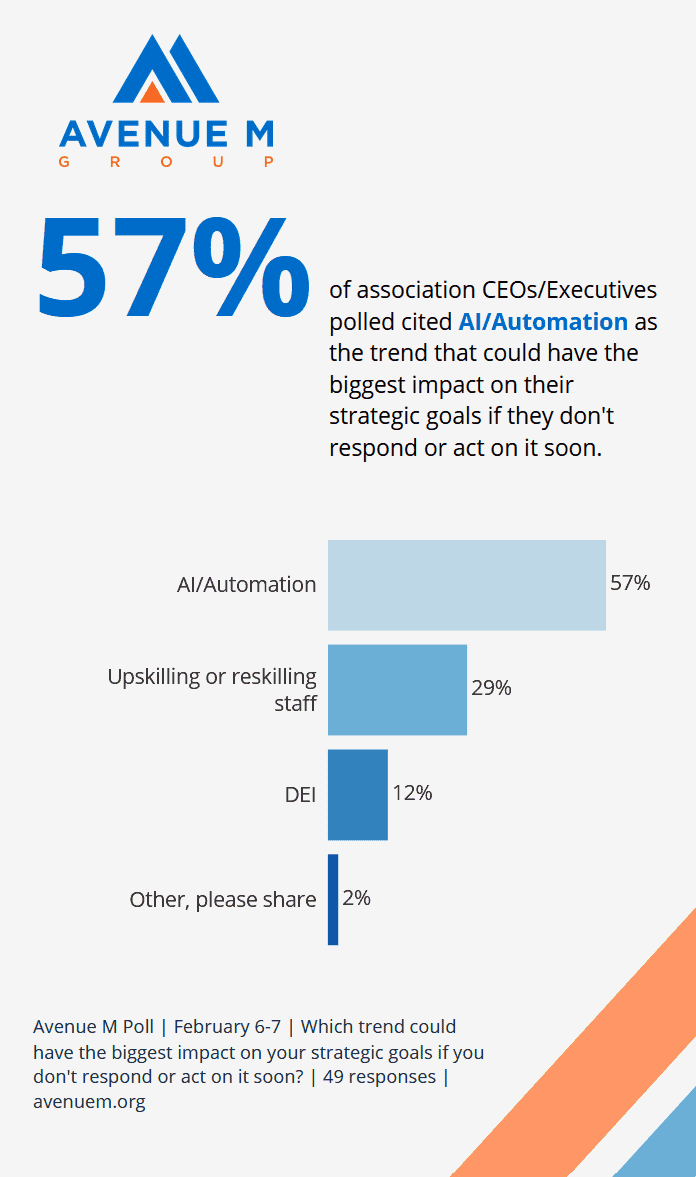Resources
Majority of Executives Acknowledge AI/Automation Is Likely to Impact Strategic Goals
While AI is a priority for many associations in 2024, executives also recognize the need for advancing staff skills and maintaining momentum on DEI initiatives.
Initially feared for various reasons including ethics, job loss, and legal concerns, Artificial Intelligence (AI) has now become mainstream, leading to the emergence of a significant new role across multiple sectors, as reported in a recent New York Times article: the senior executive overseeing AI implementation.
It looks like AI has not only arrived, it’s here to stay.
 Many associations agree. An early-February Avenue M text poll and LinkedIn poll revealed that 57 percent of association executives say that AI could have the biggest impact on their strategic goals if they don’t act on it. In comparison, 29 percent said reskilling or upskilling staff could have the biggest impact, and only 12 percent said DEI.
Many associations agree. An early-February Avenue M text poll and LinkedIn poll revealed that 57 percent of association executives say that AI could have the biggest impact on their strategic goals if they don’t act on it. In comparison, 29 percent said reskilling or upskilling staff could have the biggest impact, and only 12 percent said DEI.
When asked which of the three trends—AI, upskilling, or DEI—would exert the greatest influence on strategic goals if left unaddressed, an association CEO said, “AI will permeate and has already begun to permeate various aspects of my members’ organizations. We have to help them understand AI and how to use it to their benefit ASAP.”
Another CEO said, “We do nothing with AI now, but imagine we will begin the journey within the next year on some level.”
In terms of the other trends, although reskilling and upskilling present obstacles for associations, association leaders recognize the need to make skill enhancement and retraining a priority, especially for emerging technologies.
One leader said, “As we look to implement various AI tools, we need to simultaneously train our teams to understand, use, and embrace them. We are actively enrolling staff in webinars and classes to ensure they have the resources needed for the AI tsunami!” Another executive said, “The staff has not been developed over the past 15 to 20 years. There is significant growth that needs to happen.”
While AI has gained in popularity, DEI initiatives have often had a different trajectory largely because they were hastily executed in the wake of George Floyd’s murder in 2020 and then momentum stalled. However, it is still essential to prioritize DEI with a comprehensive, long-term plan. A CEO said not focusing on DEI means risking the loss of “engagement and credibility with members.”
Another panelist shared, “Everyone’s going to say AI. The thing is a world without people who drive AI doesn’t give AI anything new or different to learn. It’s the world with unique perspectives offered by a diverse set of backgrounds that gives AI a rich, large language model from which to learn.”
While AI is a priority, reskilling, upskilling, and prioritizing DEI initiatives remain crucial. These efforts are vital for navigating the evolving technological landscape and fostering an inclusive environment essential for associations’ development and success.
Want to participate in future text polls? You can sign up HERE.
For more insights on AI, upskilling, and DEI in 2024, read Avenue M’s quick summaries of the following resources, and click the links below.
AI in the Workplace: Looking Ahead to 2024
AI caught a lot of people off guard in 2023, but now its potential is definitely being harnessed. What does AI have in store for workplaces and HR? Experts posed the following AI predictions for 2024.
- AI will revolutionize HR, speeding up its introduction and leading to widespread use for hiring and automating tasks, which could possibly reshape HR roles.
- In 2024, AI integration into the workforce will reach unprecedented levels, with AI becoming a common co-worker, highlighting the importance of soft skills like growth mindset and self-awareness.
- Expect AI to take on more managerial and HR responsibilities, including career coaching, streamlining tasks like copywriting, and assisting leaders in navigating workplace challenges by 2024.
Advancing DEI In 2024: Strategies for Leaders and Changemakers
In 2024, with a changing socio-political landscape and increased focus on diversity, equity, and inclusion (DEI), traditional training is no longer effective. This roadmap provides actionable strategies to help organizations create inclusive workplaces, tailored to diverse experiences and aligned with employee and stakeholder values.
To address the DEI challenges of 2024, organizations must adopt a tailored strategy: evaluate current efforts, invest in customized initiatives, and communicate clear stances on social issues. This approach fosters an inclusive culture where diversity is celebrated, equity is prioritized, and inclusion is the standard.
Skill Up or Get Left Behind: Why Upskilling Your Employees Is Critical In 2024
In an evolving post-pandemic job market, organizations need to focus on upskilling, reskilling, and skilling employees for success. Skilling helps people start new jobs, reskilling enables career shifts, and upskilling boosts skills for ongoing relevance.
Investing in employee training is essential for talent retention. According to research, 81 percent of workers are interested in employer-funded programs. Providing internal career paths shows employees they have a future with the organization, encouraging them to stay and improve their skills.
Want to be the first to be notified about articles like this? You can learn more about Avenue M’s texting poll service HERE.
Contributors: Sheri Jacobs, FASAE, CAE & Lisa Boylan
Image: Adobe Stock